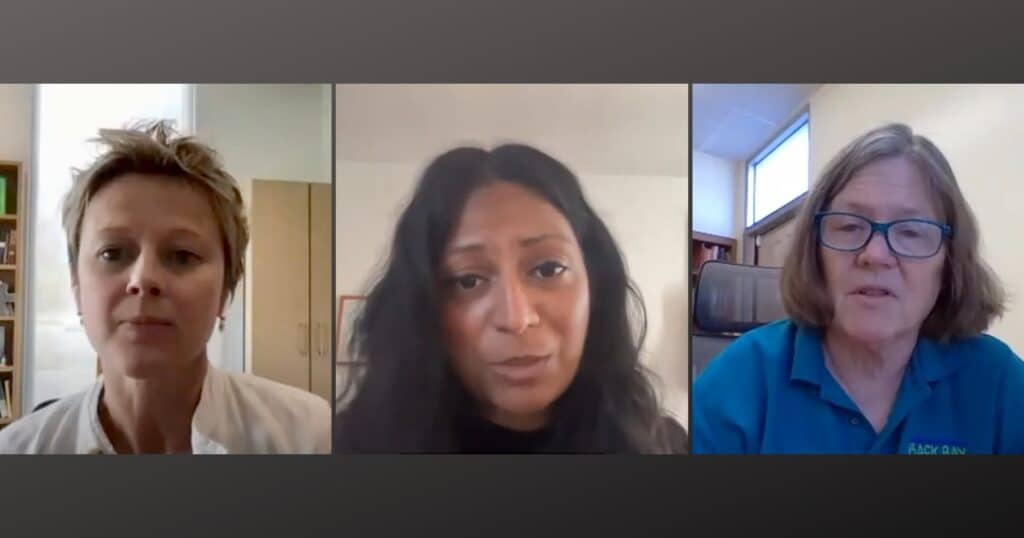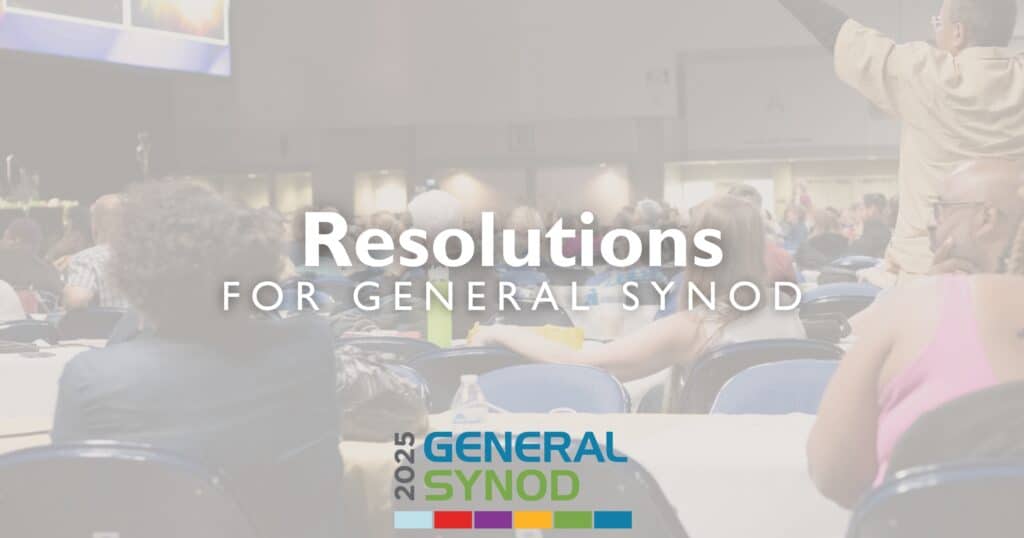‘Brave Conversations’: Webinar speakers navigate interfaith relations in time of deep polarization
With the Middle East conflict fueling antisemitic and anti-Muslim rhetoric and violence in the United States, United Church of Christ national staff and pastors gathered for a webinar on “Navigating Interfaith Relations in the Midst of Global Conflict.”
“This is an important conversation you told us you need,” said the Rev. Shari Prestemon, acting associate general minister of the UCC and co-executive of Global Ministries, the shared witness of the UCC and the Christian Church (Disciples of Christ).
Prestemon, recognizing the tensions congregations are feeling within their communities around what’s happening in the Middle East and elsewhere in the world — and their need for “a place to sort it out” — opened the April 10 webinar with a reminder to keep Eastertide eyes fixed on the resurrection. She also acknowledged how difficult that is when struggling to understand the “deep conflict and horrific violence” being seen.
“Things are so polarized that there is a real hesitancy to bring up conversations. Yet we need to hold space for brave conversations and sit with the discomfort,” said Prestemon.
Hesitancy and silence as symptoms
Liz Nash, moderator of the Congregational Church of Austin, knows all too well about hesitancy to talk. In early February, her Texas community was rocked by a hate crime when a Palestinian American was stabbed on his way home from a rally for Gaza. The incident happened four blocks from Nash’s church. Nash and the Rev. Ginny Brown Daniel, interim pastor of the Austin church, wrote a response condemning the attack.
While a small congregation, they have always been quick to act. But Nash observed in the days following the stabbing, media coverage and community mobilization was slow in coming.
“Our church prays for Gaza many Sundays. We have great pastoral focus on social justice, but we found ourselves turned inward. We’ve always found liberal partners to work with, but this time we couldn’t find them,” said Nash, specifically noticing a lack of prayer vigils or other community calls to action. “I feel we are caught between two sides, walking carefully, but as we struggle there are innocent people being hurt or even killed.”
Nash wondered if the silence that ensued the February hate crime was a symptom of weariness to all the violence in the world.
“Are we just too overwhelmed? Or perhaps too tired?” she asked.
Sharing positive stories
Nina M. Fernando, executive director of the Washington, D.C.-based Shoulder to Shoulder Campaign, a multifaith organization founded in 2010 to address anti-Muslim hatred and discrimination, raised the importance of sharing positive stories when fostering interfaith relationships. Mental health advocates also cite the importance of positivity in the prevention of compassion fatigue.
“We are saturated in negativity,” said Fernando. “We need to point to the positive.”
Fernando encouraged webinar viewers to think about sharing stories that heal through op-eds, sermons, and social media posts. She also underscored the importance of creating safe spaces to share both differences and commonalities, inviting people in with “humility, knowing there will be mistakes made.”
For example, this past March, Shoulder to Shoulder held its Ramadan 2024 campaign in which 140 Iftars — the evening meal that breaks the Ramadan fast — were hosted in 36 states.
“It was a great way to get to know Muslim neighbors,” said Fernando.
Fernando also recognized that while many want to act, sometimes fostering interfaith relationship is not about doing but about being.
“Sometimes we just need a space to cry,” she said.
Modeling interfaith life together
In Omaha, Nebraska, there is such a space where Jews, Christians, and Muslims are becoming a beacon of hope, providing a safe place for conversations and community building.
The Tri-Faith Initiative is a campus where Countryside Community Church, Temple Israel, and the American Muslim Institute reside within walking distance of one another. Bridging the gap among the three buildings is literally a bridge — Abraham’s Bridge.
“We can cross the bridge to one campus to share a meal, then cross back to another campus in a time of conversation,” said the Rev. Jenny Shultz-Thomas, pastor of the UCC Countryside congregation.
According to Shultz-Thomas, Tri-Faith is a model of working together that emphasizes the importance of building relationships before tragedy or conflict happens. That doesn’t mean, though, the co-location community doesn’t have its struggles.
“Every time you take a step forward you have the complexities that go with it,” she said.
Shultz-Thomas observed that during times of frenzied media coverage on global conflicts, groups like Tri-Faith feel what she called “statement pressure.”
“Statements hold a lot of weight. Yet while words are important, they can also harm,” said Shultz-Thomas.
Tri-Faith, though, believes a powerful statement is not necessarily a written document. Rather, according to Shultz-Thomas, “the statement we are putting out in the world is how we are living together.”
“Does co-location foster community? Definitely. It also invites us to deepen the relationships that community grows. This is not an experiment, this is what God intends for all of God’s people,” she said.
And how we are living together, according to the Rev. Mark Pettis, UCC ecumenical and interfaith relations manager, involves committing to building relationships no matter how difficult the challenges or conflict, willingly sharing honestly with one another, and listening graciously.
Peter Makari, global relations minister for the Middle East and Europe for Global Ministries, also adds that criticism of a nation’s policies doesn’t equate to hate against a people. “We have to be clear to separate the two,” said Makari.
The UCC has shared several statements and pastoral letters addressing the crisis in the Middle East.
The full webinar recording on Navigating Interfaith Relations in the Midst of Global Conflict is available for viewing here.
Donna Jackson is a communications specialist for the United Church of Christ.
Content on ucc.org is copyrighted by the National Setting of the United Church of Christ and may be only shared according to the guidelines outlined here.
Related News
Persona non Grata
The first time I heard the term persona non grata I was a child living in Jamaica, where I was...
Read More‘Natural Spirituali-teas’ vlog from UCC General Minister & President explores spirituality
It's time to spill the tea--the Rev. Karen Georgia Thompson, United Church of Christ General...
Read MoreResolutions for General Synod 35 span global contexts, holistic health, Conference change
The final proposed resolutions for General Synod 35 are now available for review. Eight...
Read More




